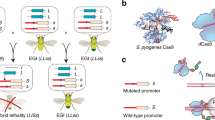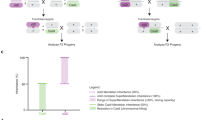Abstract
NON-TRIVIAL frequencies of spontaneous male recombination in the hybrid progeny of Drosophila melanogaster males from so-called ‘male recombination strains’ and laboratory marker stock females are well documented1,2. Attempts to induce male recombination by injection have produced conflicting results. The positive results originally claimed by Reddi et al.3 were not reproducible in two subsequent studies4,5. Sochacka and Woodruff6 have suggested that the disparity in results may be attributable to the use of extracts from a male recombination strain in the former study only. They injected extracts from the male recombination strain OK1 (ref. 7) into laboratory marker strain females. These were crossed to the Canton-S strain, which lacks spontaneous male recombination potential, producing F1 hybrids which yielded a low frequency of male recombination. Injection directly into F1 hybrid males also yielded some recombinants. Similar tests using Canton-S as the source of the extract were negative. We describe here large-scale tests with different male recombination strains. We could not reproduce the injection effect of Sochacka and Woodruff, suggesting that their results may not be generally applicable. We suggest, furthermore, that the genetic implications of a negative injection result may be at least as interesting as those of a positive result. A positive result would imply the existence of some co-existing, possibly non-essential, factor, such as a virus or episome. This would rule out explanations for male recombination based on incompatability of genetic organisation in different strains. Explanations of this type, for example, in terms of spatial organisation of chromosomes8, have potentially important implications for normal nuclear organisation.
This is a preview of subscription content, access via your institution
Access options
Subscribe to this journal
Receive 51 print issues and online access
$199.00 per year
only $3.90 per issue
Buy this article
- Purchase on Springer Link
- Instant access to full article PDF
Prices may be subject to local taxes which are calculated during checkout
Similar content being viewed by others
References
Hiraizumi, Y. Proc. natn. Acad. Sci. U.S.A. 68, 268–270 (1971).
Kidwell, M. G., Kidwell, J. F. & Sved, J. A. Genetics 86, 813–833 (1977).
Reddi, O. S., Reddy, G. M. & Rao, M. S. Nature 208, 203 (1965).
Singer, K. M., Chovnick, A., Suzuki, D. T., Baillie, D. & Hoar, D. Nature 214, 503–504 (1967).
Saraswathy, T. Experientia 26, 799 (1970).
Sochacka, J. H. M. & Woodruff, R. C. Nature 262, 287–289 (1976).
Woodruff, R. C. & Thompson, J. N. Heredity 38, 291–308 (1977).
Sved, J. A. Aust. J. biol. Sci. 29, 375–388 (1976).
Kidwell, M. G. & Kidwell, J. F. J. Hered. 66, 367–375 (1975).
Author information
Authors and Affiliations
Rights and permissions
About this article
Cite this article
SVED, J., MURRAY, D., SCHAEFER, R. et al. Male recombination is not induced in Drosophila melanogaster by extracts of strains with male recombination potential. Nature 275, 457–458 (1978). https://doi.org/10.1038/275457a0
Received:
Accepted:
Published:
Issue Date:
DOI: https://doi.org/10.1038/275457a0
Comments
By submitting a comment you agree to abide by our Terms and Community Guidelines. If you find something abusive or that does not comply with our terms or guidelines please flag it as inappropriate.



